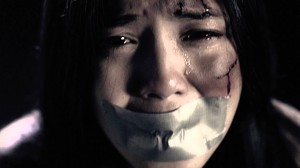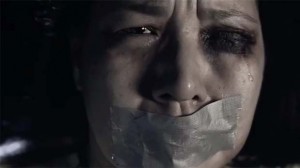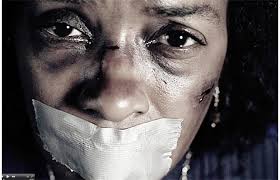Is EPS domestic violence ad too shocking?
Posted on January 19, 2014 By Mike Ross Crime, Front Slider, Life, life, News, news, TV and Radio, tv and radio
There’s a disturbing television commercial you may have seen over the holidays: Close-ups of weeping women whose faces are covered in cuts and bruises, their mouths sealed with duct tape. Sinister music and panicked voices on the telephone are heard in the background.
The women are actors. The message is real: “Speak out. They need your help.”
The video was produced by the Edmonton Police Service in an effort to fight domestic violence, sending the message that silence makes the problem worse. Along with billboards, LRT posters and ads in lounge washrooms, the Speak Out video aired two years ago on Global Edmonton TV, and was brought back for a campaign in December 2013. Of course it will also be on YouTube for all time.
Does it have to be so shocking?
 A number of people asked to view the video, men and women, noted how effective it is. “Painful, but perfect,” said one. Some said it should have a disclaimer, or a so-called “trigger warning.” Content might not be suitable for those who cannot understand symbolism, a child, for instance, who doesn’t understand that the duct tape is meant to be symbolic of the victims being silenced by fear, and not images one might see fictionalized in sick TV shows like Dexter, suggestive of abduction by a serial killer. That’s a different horrific crime altogether. Of course domestic violence victims sometimes suffer worse fates.
A number of people asked to view the video, men and women, noted how effective it is. “Painful, but perfect,” said one. Some said it should have a disclaimer, or a so-called “trigger warning.” Content might not be suitable for those who cannot understand symbolism, a child, for instance, who doesn’t understand that the duct tape is meant to be symbolic of the victims being silenced by fear, and not images one might see fictionalized in sick TV shows like Dexter, suggestive of abduction by a serial killer. That’s a different horrific crime altogether. Of course domestic violence victims sometimes suffer worse fates.
Looking at it only from a marketing angle, not easy to do, the images are clearly designed to shock the viewer into paying attention.
“It’s not premised solely on shock,” defends EPS spokesperson Scott Pattison, who wrote and produced the video. “It’s premised that this is what this crime looks like. It’s graphic stuff, and it’s not pretty. Sometimes you think outside of the box to impact change. Sometimes when you’re trying to communicate a serious issue, to get people’s attention in such a sea of messaging out there these days, you’ve got to speak directly to them. And the direct truth about this crime is that it’s pretty ugly.”
Janine Fraser, executive director of WIN House, agrees that the video is “graphic and shocking,” but says that it works for her.
 “I think it’s very real,” she says. “I take the duct tape over the mouths as being silenced, and as long as our society, our culture, stays silent about the issue, we’ll continue to have victims. I understand why women are silent about the issue, fearful to report it, or even talk about it, because of possible further violence. It’s the fear that keeps them silent. As long as everyone stays silent, we’re going to continue to have victims.”
“I think it’s very real,” she says. “I take the duct tape over the mouths as being silenced, and as long as our society, our culture, stays silent about the issue, we’ll continue to have victims. I understand why women are silent about the issue, fearful to report it, or even talk about it, because of possible further violence. It’s the fear that keeps them silent. As long as everyone stays silent, we’re going to continue to have victims.”
While crime rates in general in Edmonton have been going down, Pattison says, domestic violence cases are up. The numbers are alarming. There was a big jump from 6,313 cases reported in 2011 to 7,856 in 2012, with 7,646 reports in 2013.
This doesn’t necessarily mean that problem is getting worse; it may reflect the fact that both citizens and law enforcement are getting better at noticing it. The same discussion is going on about autism. The numbers may reflect how effective the domestic violence campaigns are, Pattison says, as more and more victims are refusing to stay silent. Sister Lucinda Patterson from the The Lurana Shelter Society reports an increase in help centre calls and telephone support, while intakes have been “up and down” over the last five years. As for the EPS video, she’s surprised anyone would have a problem with it.
“I don’t think there’s anything shocking about it,” Patterson says. “I think what children are being exposed to is sometimes far worse than that.” She adds that abused children who view the video might have “no reaction at all.”
Both Fraser and Sister Lucinda work with victims of domestic violence on a daily basis. They are not easily shocked.
 There’s an African-Canadian woman among the three victims depicted in the 16 second version of Speak Out. Pattison says it’s purposely meant to include abuse victims who happen to be recent immigrants. This city has a large and growing African Muslim population.
There’s an African-Canadian woman among the three victims depicted in the 16 second version of Speak Out. Pattison says it’s purposely meant to include abuse victims who happen to be recent immigrants. This city has a large and growing African Muslim population.
“Edmonton is a unique Canadian city in some respects; it’s not a typical prairie city,” Pattison says. “There are so many ethnicities here and some of them have cultures with male-dominated families. We’re trying to empower not just the victims but the cultures to prevent domestic violence.”
This is dangerous ground. Last October, the ETS decided to pull off bus ads that addressed Islamic “honour” killings – with the provocative text “Is Your Family Threatening You? Is There a Fatwa on Your Head?” – after complaints, primarily from Edmonton City Councillor Amarjeet Sohi. A spokesman from the American Freedom Defense Initiative, which produced the ads, told the CBC, “One Muslim councillor voices unhappiness with this ad and they take an ad campaign down? What is controversial about trying to help girls? Honour killing is a grim reality that is largely ignored, and girls are suffering as a result. There is a real genuine threat, and there are few resources for these girls.”
The ads are reportedly being reviewed by Advertising Standards Canada.
No expert in marketing, social work or law enforcement was willing go on the record to criticize the EPS video in any way. Privately, some expressed qualms: That it’s too shocking, that it doesn’t quite hit the proper message, that it’s directed at witnesses – “they” need your help – who may be powerless if the victim is afraid to speak out.
The Television Bureau of Canada for its part reviewed the spot and confirmed that it does meet all the current Canadian broadcast standards. The EPS received exactly one complaint after the ads ran two years ago, Pattison says. Nothing since.
The campaign is over now. The EPS is already putting thought into the next one, which may consider including male victims or victims in same sex relationships.
“Those cases don’t often get reported because there’s such a stigma attached,” Pattison says. “In 2012, 12% of the victims were males. So we had to make a decision for this spot. We focused on the majority. Perhaps we’ll reanalyse it. Obviously there’s a segment of society that continues to endure that sort of abuse.”













